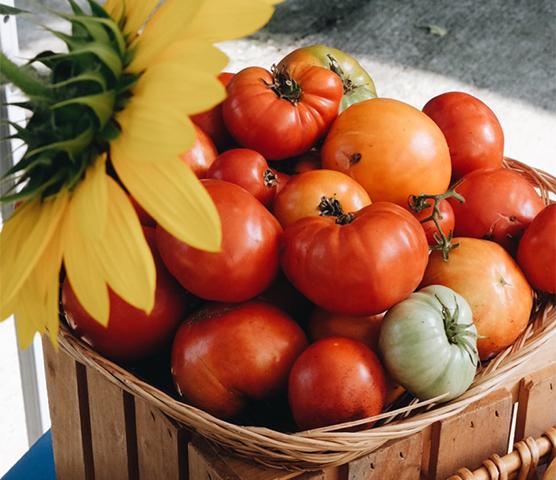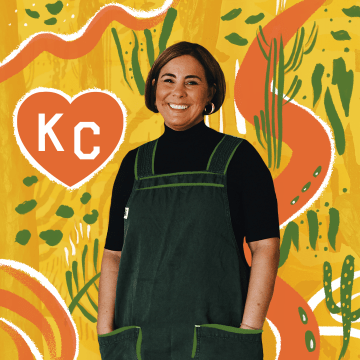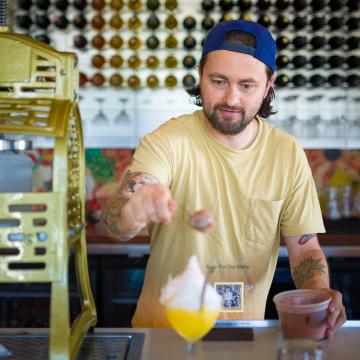
From Farm to KC Tables

Kansas City’s farm-to-table scene is not just a trend — it’s a movement deeply rooted in the city’s commitment to building community and promoting sustainability.
From urban farms to award-winning kitchens, talented and passionate people are looking to transform the way Kansas Citians experience food, and their work is paying off. These key players are making this vibrant culinary landscape fresher, more authentic and undeniably delicious.
No profile of Kansas City’s food scene would be complete without mentioning the backbone of the farm-to-table movement: local growers and farmers. There’s perhaps no better example of sustainable urban agriculture than Young Family Farm.
The Young family has called East Kansas City’s Ivanhoe neighborhood home since 1986, gardening in the vacant lots they’ve slowly acquired as “an extension for our love for gardening and a recognition of the need for healthy food,” according to matriarch Yolanda.
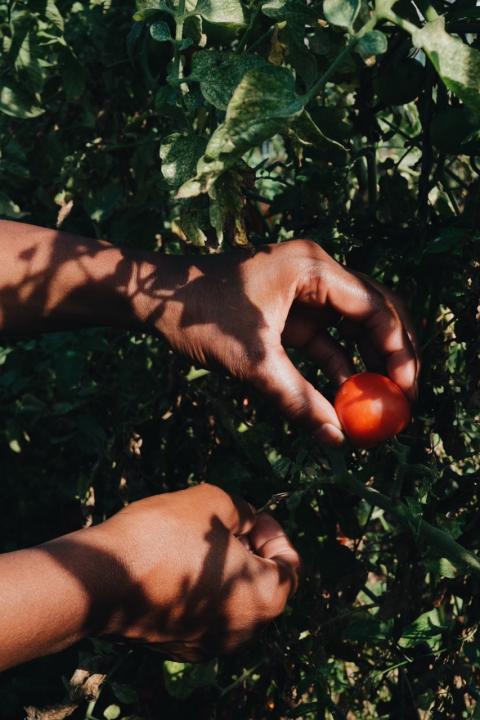
“The love of getting my hands in the dirt is different than starting a business,” she shares. “We’re constantly looking for other creative ways of filling the need for fresh produce and getting the food to people.”
Together with her husband Alan, her brother Stacy and her children Alana, Alex and “AY,” the Youngs grow every vegetable imaginable on their neighborhood farm, selling the harvest at their Saturday produce stand and directly to local restaurants.
While the farm-to-table movement is often associated with high-end dining, at its roots, it’s an opportunity to significantly impact community health. Organizations like Kanbe’s Markets are putting Kansas City on the map as a national leader in showcasing how local food can be a force for good.
“It’s estimated that more than one-third of all the food we grow in the U.S. goes to waste,” Kanbe’s Founder and CEO Max Kaniger shares. “Meanwhile, one in eight Americans don’t know where their next meal is coming from. The root cause of that is clearly a distribution problem, but it’s fixable.”
Kanbe’s aim is to make Kansas City the first metro area in the country to fully eradicate food deserts. Since 2016, the nonprofit Whas provided fresh, affordable produce to neighborhoods that lack access to grocery stores. By sourcing from local farms and wholesale retailers, the organization works with small business owners to install self-service “Healthy Corner Stores” in gas stations and convenience stores throughout the region. Much of Kanbe’s fundraising and community-building work is done in partnership with local restaurants, helping to build a healthier, more equitable city.

Of course, the term “farm-to-table” was popularized by chefs and restaurateurs looking to return to their roots by offering the freshest, most flavorful dishes possible. There is perhaps no one in Kansas City who has done more for this movement than Chef Ted Habiger, a three-time James Beard Foundation Outstanding Chef Award nominee.
Ted’s restaurant, Room 39, as well as his recent work to overhaul the dining program at the Kemper Museum of Contemporary Art, are both centered on local farmers and sustainable agriculture. He has garnered a loyal following for his straightforward food philosophy: let the ingredients speak for themselves.
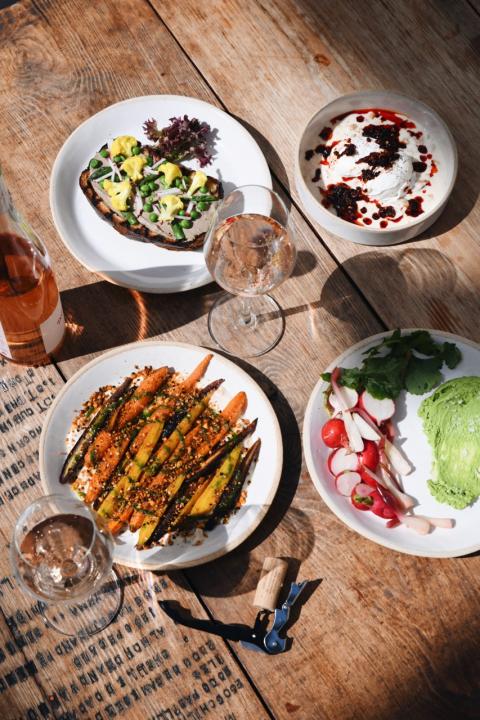
“I run ingredients-based restaurants,” Ted says. “Our food is only as good as the farms that we buy from.” The menus at Room 39 are printed daily to reflect what’s in season, highlighting the best of what’s available from local farms.
Whether it’s a summer salad featuring Crum’s Heirloom tomatoes or a winter dish of Campo Lindo chicken and Thane Palmberg Farms’ roasted root vegetables, every dish Ted serves is a celebration of the region’s agricultural prowess.
“I’ve been working with some of the same farmers since 1995. I’ve watched their kids grow up, so there’s a real sense of family. We’re part of their ecosystem, just as they’re part of ours.”
In some cases, farms themselves are getting in on the action. For more than 20 years, Green Dirt Farm, an award-winning sheep’s milk cheese maker nestled in the hills of Weston, Missouri, has proudly produced small-batch, artisan products that highlight the rich, earthy flavors of the region. Their latest venture, Green Dirt on Oak, is a testament to their commitment to sustainability.
“People today are eating as much with their minds and ethics as they are with their palates,” says Executive Chef Oskar Arévalo. “The further apart we grow from the tangible world of agriculture, the greater our yearning to understand and appreciate where our food comes from.”
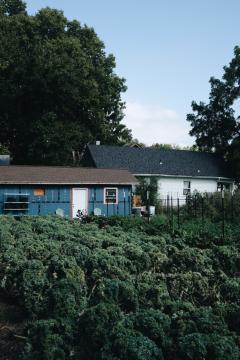
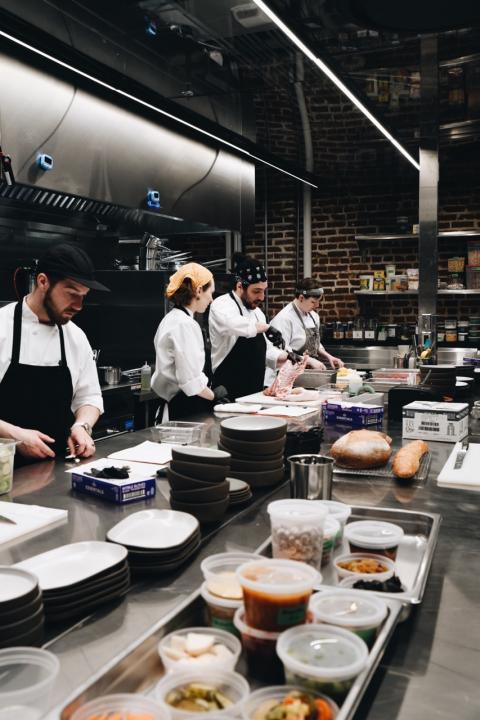
Green Dirt on Oak’s menu celebrates the farm’s cheeses alongside locally sourced meats and produce. The restaurant’s bucolic feel, amidst the steel and glass of Downtown Kansas City, makes it the perfect spot for a relaxed yet refined dining experience that stays true to the farm’s — and the region’s — unique flavors.
“The entire farm-to-table movement is an expression of our desire to stay connected to the earth under our feet and the people at our table,” Oskar argues. “It’s a privilege to work with animals and products that reflect Kansas City’s story.”
At some restaurants, the intentional use of produce extends from the kitchen into the bar. In the Stockyards District, The Campground leans into a nostalgic, campy vibe, offering a menu that draws heavily on local ingredients. Since its conception, owners Chris Ciesiel and Cristin Llewellyn have seen local food and drink as an imperative.
“We’re privileged to work with some amazing farmers and producers from both sides of the state line,” Chris says. “Our team loves the challenge of working with what’s available on any given week and finding a way to repurpose waste or excess we might have from the kitchen.”
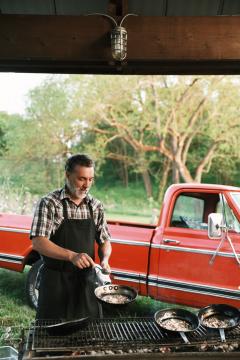
The Campground’s cocktail menu incorporates local, farm-fresh ingredients as well as regional spirits, making it a true reflection of Kansas City’s food scene. Nothing goes to waste — if they receive a batch of local peaches, even the leaves will be used, transformed into a tea-like syrup.
Whether you’re savoring a handcrafted cheese, enjoying a show-stopping meal or picking up locally grown produce at one of the city’s many farmers markets, Kansas Citians are all too eager to participate in a culinary tradition that values sustainability, quality and community. This vibrant scene is a testament to the power of local food — a community-driven movement bringing together the best of what Kansas City has to offer on every plate.

